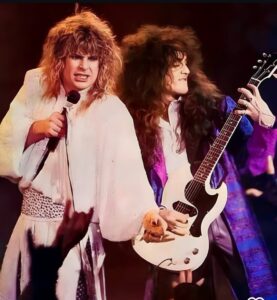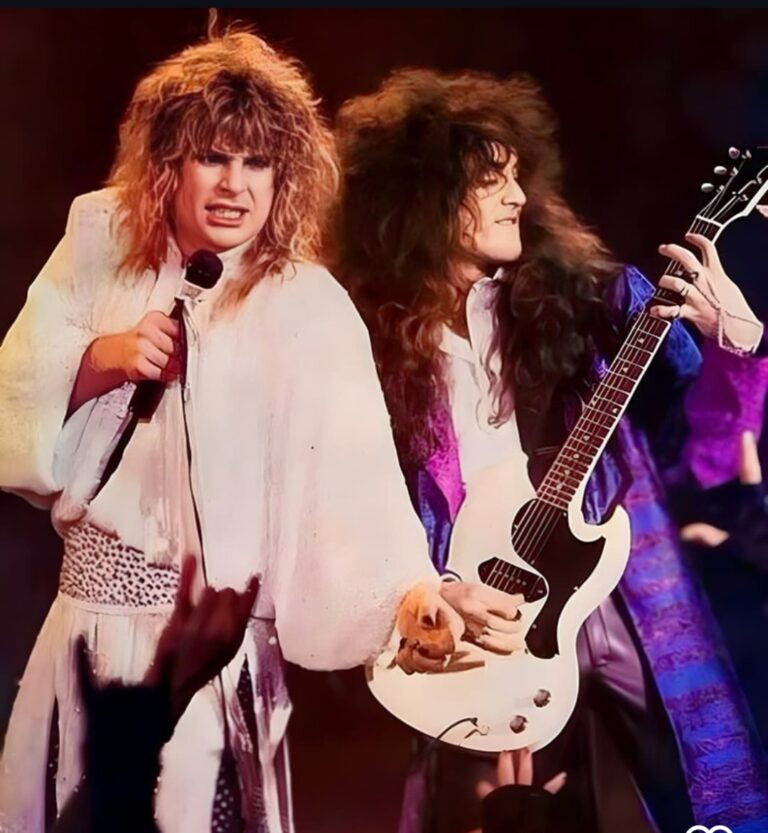Birmingham, UK – On July 5, 2025, the heavy metal world gathered at Villa Park in Birmingham, England, for “Back to the Beginning,” a historic concert marking Ozzy Osbourne’s final performance and Black Sabbath’s last-ever show. Among the all-star lineup, former Ozzy Osbourne guitarist Jake E. Lee received a hero’s welcome, but for the 68-year-old musician, the true highlight was reconciling with the late Prince of Darkness, mending a decades-long rift that began in the turbulent 1980s.
In an emotional interview with Guitarist, Lee reflected on his time with Osbourne, the bittersweet reunion, and the profound impact the iconic frontman had on his career. “He changed everything for me,” Lee said. “He put me in the spotlight. Whether that would have happened if I hadn’t been in his band is anybody’s guess.”
Lee joined Osbourne’s solo band in 1982, stepping into the daunting role of replacing the legendary Randy Rhoads, who tragically died in a plane crash that year. As a maverick guitarist with no interest in mimicking Rhoads or chasing the flashy style of Eddie Van Halen, Lee carved his own path, contributing to two seminal albums—Bark at the Moon (1983) and The Ultimate Sin (1986). His work on tracks like the iconic “Bark at the Moon” helped solidify Osbourne’s solo career post-Rhoads, proving the singer was far from finished. “It was such a good tune,” Lee beamed. “It helped confirm that Ozzy wasn’t over just because Randy had passed. I’m proud to have been a part of that.”
However, Lee’s tenure with Osbourne was not without its challenges. Replacing a beloved figure like Rhoads brought immense pressure, and Lee struggled to connect with Osbourne on a personal level. “They weren’t like brothers and they weren’t best friends,” Guitarist noted. The situation grew messier due to business disputes, with Lee alleging that Sharon Osbourne, Ozzy’s wife and manager, pressured him into signing a contract that denied him songwriting credits and royalties for Bark at the Moon. By the time The Ultimate Sin was recorded, Lee fought for proper credit, a move that likely contributed to his abrupt firing in 1987 via a phone call from Sharon.
Despite the messy exit, Lee harbored no lasting resentment. “I always wanted to reconcile, tell him there weren’t any hard feelings and end things on a friendly note,” he shared. “I got to do that.” The opportunity came when Rage Against the Machine’s Tom Morello, the musical director for “Back to the Beginning,” personally invited Lee to join the event, insisting the show wouldn’t be complete without him.
At the concert, Lee performed “The Ultimate Sin” and “Shot in the Dark” instead of the expected “Bark at the Moon,” citing physical challenges from arthritis and a recent shooting incident in October 2024 that left him recovering from injuries. Though their time together at the event was brief, Osbourne reached out afterward with a heartfelt text: “Hi Jake, I’m so sorry I couldn’t spend more time with you on the weekend but it was really chaotic. I would really like to see you when I eventually get back to L.A. to shoot the shit, it’s been so long since we saw each other… much love and respect, Ozzy.”
Tragically, Osbourne passed away on July 22, 2025, at age 76, just weeks after the concert, leaving Lee to process the loss. “The finality of it hits me in waves,” he wrote on social media, sharing the poignant final message. Lee also recalled a pivotal moment from their time together when Osbourne’s single comment—“You’re a rock star”—made him a better guitarist, boosting his confidence during the high-pressure Bark at the Moon sessions.
Despite past tensions, Lee’s admiration for Osbourne remained unwavering. “He had a rare personality… this clownish, funny, sweet guy,” he said. “That’s why it’s so hard to fully comprehend that he’s gone.” The reconciliation at “Back to the Beginning” not only closed a chapter for Lee but also underscored Osbourne’s lasting impact as a mentor and icon who introduced the world to guitar greats like himself, Randy Rhoads, and Zakk Wylde.
As tributes pour in for the Prince of Darkness, Lee’s story serves as a testament to Osbourne’s ability to forge enduring bonds, even through decades of silence. For Lee, the chance to mend their rift was worth more than any spotlight—a fitting farewell to a heavy metal legend.
